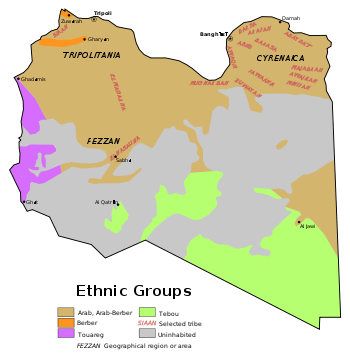Languages of Libya
| Languages of Libya | |
|---|---|
|
Ethnic composition of the Libyan population in 1974 (CIA map) | |
| Official languages | Standard Arabic |
| Vernaculars | Libyan Arabic, other varieties of Arabic |
| Minority languages | various Berber languages, Domari, Tedaga |
| Main foreign languages | English, Italian, French |
| Sign languages | Libyan Sign Language |
The official language of Libya is Modern Standard Arabic. Most residents speak one of the varieties of Arabic as a first language, most prominently Libyan Arabic, but also Egyptian Arabic and Tunisian Arabic.
Major language
Arabic
The official language of Libya is Arabic. The local Libyan Arabic variety is the common spoken vernacular.
Minority languages
Berber
Various Berber languages are also spoken, including Tamasheq, Ghadamis, Nafusi, Suknah and Awjilah.[1] Both Berber and Arabic languages belong to the wider Afro-Asiatic (Hamito-Semitic) family.
Berber speakers number around 305,000 individuals. Of these, the most significant group, the Nafusi and Zuwara, is concentrated in the Tripolitanian region.[2] Berber languages are also spoken in some oases, including Ghadamès, Awjilah, Sawknah. Tamahaq is spoken by the Tuareg.
Libya's former Head of State Muammar Gaddafi denied the existence of Berbers as a separate ethnicity, and called Berbers a "product of colonialism" created by the West to divide Libya. The Berber language was not recognized or taught in schools, and for nearly a year it was forbidden in Libya to give children Berber names.[3][4]
After recent uprisings in Libya, the National Transitional Council (Revolutionaries) has shown an openness towards the Berber language. The independent Revolutionaries "Libya TV", has included the Berber language and its Tifinagh alphabet in some of its programming.[5]
Domari
The Domari, an Indo-Iranian language spoken by the Dom people (ca. 33,000 speakers).
Tedaga
The Nilo-Saharan Tedaga language is spoken by a few thousand Teda people.[6]
Foreign languages
Italian
Italian is still spoken among the Italian Libyan community. It is the most spoken second language in the country and serves as a language of commerce and sometimes as a lingua franca between Libyans and foreigners.[7]
Other languages
English is a notable foreign language in business and for economical purposes and also spoken by the young generation. Moreover, there are thousands of young Libyan professionals who were educated in universities in the United Kingdom and Ireland.
After the Libyan Civil War and the help coming from France, the French language started for the first time to be popular among the young generation. For that reason France will encourage the teaching of the French language in Libya.[8]
References
- ↑ "Libya". CIA. Retrieved 16 December 2014.
- ↑ David Levinson. Ethnic Groups Worldwide: A Ready Reference Handbook. p. 145.
- ↑ "Libya: Gaddafi Rails Against 'No Fly' Attacks and Berbers". allAfrica.com. 20 March 2011.
- ↑ "Libyan rebels seize western border crossing, as fighting in mountains intensifies". The Washington Post. 21 April 2011.
- ↑ Libya TV – News in Berber http://blip.tv/play/AYK4hyEC
- ↑ Languages of Libya, Ethnologue
- ↑ L'Aménagement Linguistique dans le Monde - Libye (in French)
- ↑ French FM Acknowledges Youths as Hope for the Future of Libya
